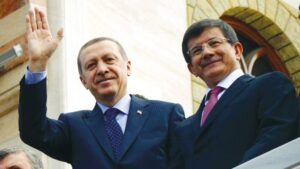Newspaper Article 25/09/2014

“The days of military coups, with so-called democratic periods in between when the military kept a constant watch over politics, is now over.” These words are commonly being used to describe Erdogan’s win in the first ever held Turkish public presidential vote. As seven of 11 presidents before Erdogan were retired generals, the significance and impact of a politician of non-military background appointed to Cankaya Palace is under review at the national, regional and global level.
This is the third time in Turkey’s political history that the prime minister has been elected as president, i.e., Turgut Özal (1989), Süleyman Demirel (1993) and Erdogan (2014). Before Özal, there was no incumbent president. When Özal died, without elections, Demirel was given charge of the president’s office. Therefore, Erdogan’s example of being a popularly elected president is the first of its kind.
Although many foreign observers have endorsed the Turkish presidential elections, several analysts are also pointing out electoral flaws, questioning the authenticity of the results. Constitutionally, Article 101 prohibits the president from being affiliated with any political party. Thus, legally, Erdogan’s ties with the ruling Justice and Development Party (AKP) should be severed and his charge as member of parliament should end. However, the president-elect continues to hold the party chairmanship. Still, there was little doubt about Erdogan’s victory this year and his re-election in 2019.
As the presidential elections are now over and the nomination of a new prime minister is done, analysis at present should focus on the significant political transformation Turkey is ready to undergo, i.e. from the parliamentary to the presidential system. Questions that need examination are: why is there any necessity to bring constitutional changes and transformation to Turkey’s political system? What is the history and founding notion of this transformation? Which factors contribute to the success or failure of this political transformation? What kind of political ontology is Turkey going to adopt?
2014 marks Erdogan’s 20th year in Turkish politics. For Erdogan and his followers, today ushers in the new Turkey, one that he aims to build until the 100th anniversary of the Republic in 2023. However, at this critical juncture, Erdogan has to make some hard choices, explained henceforth. First of all, an inherent incompatibility has been created in the Turkish parliamentary system by conducting presidential elections through popular vote. To end this incongruity, Turkey should opt between the presidential or semi-presidential system.
Secondly, to keep the letter and spirit of the constitution, Erdogan needs to quit the chairmanship of the AKP. Moreover, according to Article 128 of AKP’s charter, 70 AKP members cannot run for parliamentary elections next year. This has raised concern about holding the AKP together because, in the past, when Özal and Demirel got elected as presidents, their parties (Motherland Party and the True Path Party) were either defeated or visibly weakened. Hence, Erdogan either has to revoke a three-term ban or lead the party from behind the scenes, both of which will enhance the complexity of Turkish politics.
Thirdly, although the Turkish constitution grants various powers to the president, nevertheless wide-ranging executive powers are held by the prime minister. Possibly, if the AKP gets replaced with a new ruling party after the 2015 general elections, a crisis can erupt between two power sharers. Thus, preservation of political integrity, vibrancy and governability of the AKP is crucial during the transition period.
Fourth, prevention of major political crises necessitates the formulation of a new constitution. Since 2007, Erdogan’s idée fixe (preoccupation) is to replace the current constitution. For several reasons he has failed to do so. The foremost factor was the AKP’s lack of possession of 330 seats in parliament and failure to create consensus among political parties on issues such as governing system, language, citizenship, etc. The fifth challenge is to create good chemistry between President Erdogan and prime minister designate Ahmet Davutoglu. Analysts consider the ‘Erdogan-Davutoglu’ formula to be the right one, hoped to effectively lay down the foundations of a new Turkey.
The sixth challenge for Erdogan is to build a new Turkey for which he needs to reach out to various social groups with a policy of reconciliation. One silver lining might be the settlement of Turkey’s long-running tensions with its Kurdish minority. Last, to continue ruling the masses, Erdogan needs to maintain his popularity by avoiding drawbacks that have, in the last few years, raised suspicions, e.g. the crackdown on the Gezi protesters, a violent outburst against a protester in Soma or the steps Erdogan took to control the media and ban the social media.
Summing it up, it can be said that Erdogan remains fully aware of his exceptional role in Turkey’s political history. For the last 12 years, Erdogan has been politically pioneering a transformation process by encountering numerous coup attempts that have had a positive influence on his standing. He now seeks to exploit his position during this transition period to usher in an era of major restoration and construction. An added advantage would be the AKP’s continuation as ruling party, hoped to pave the way for a new Turkey, eventually preparing it for a new century.
Published by Daily Times on 19th September, 2014
Disclaimer: Views expressed are of the writer and are no necessarily reflective of IPRI policy.
